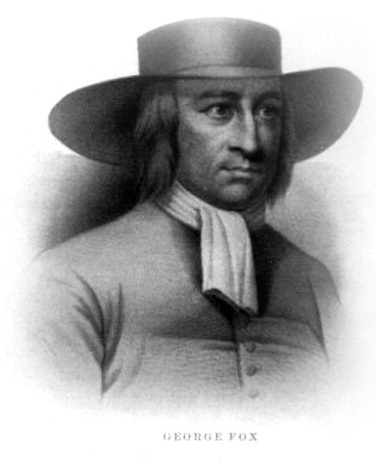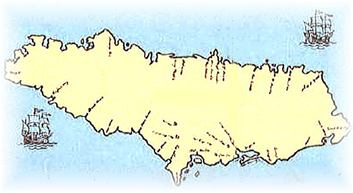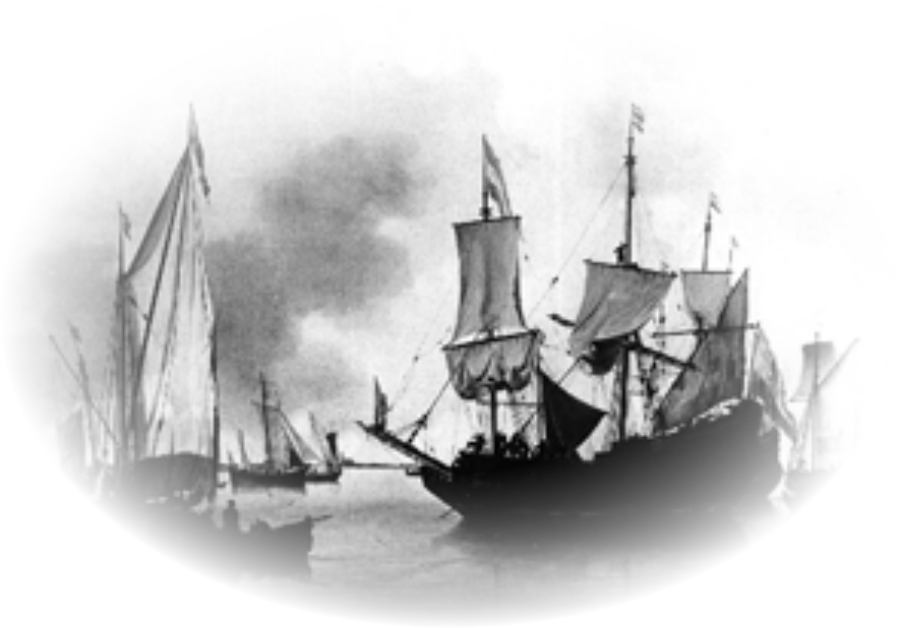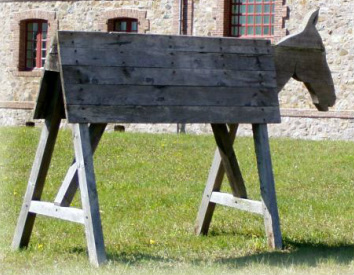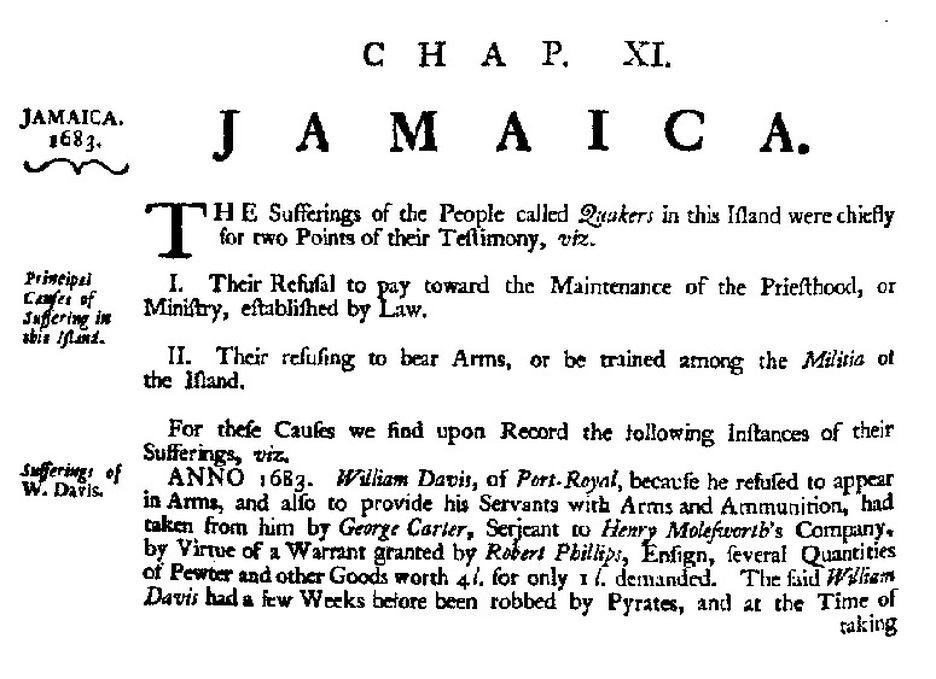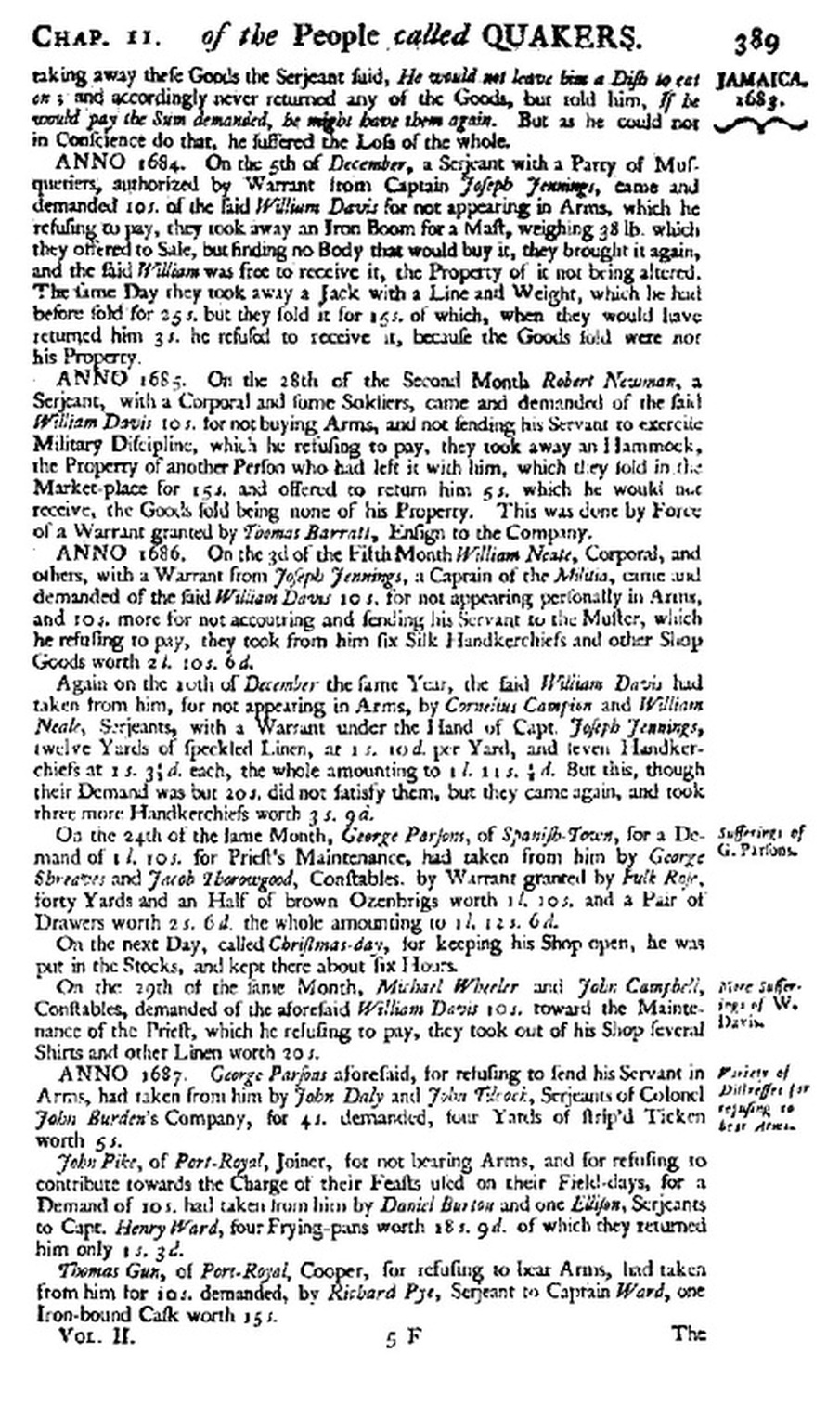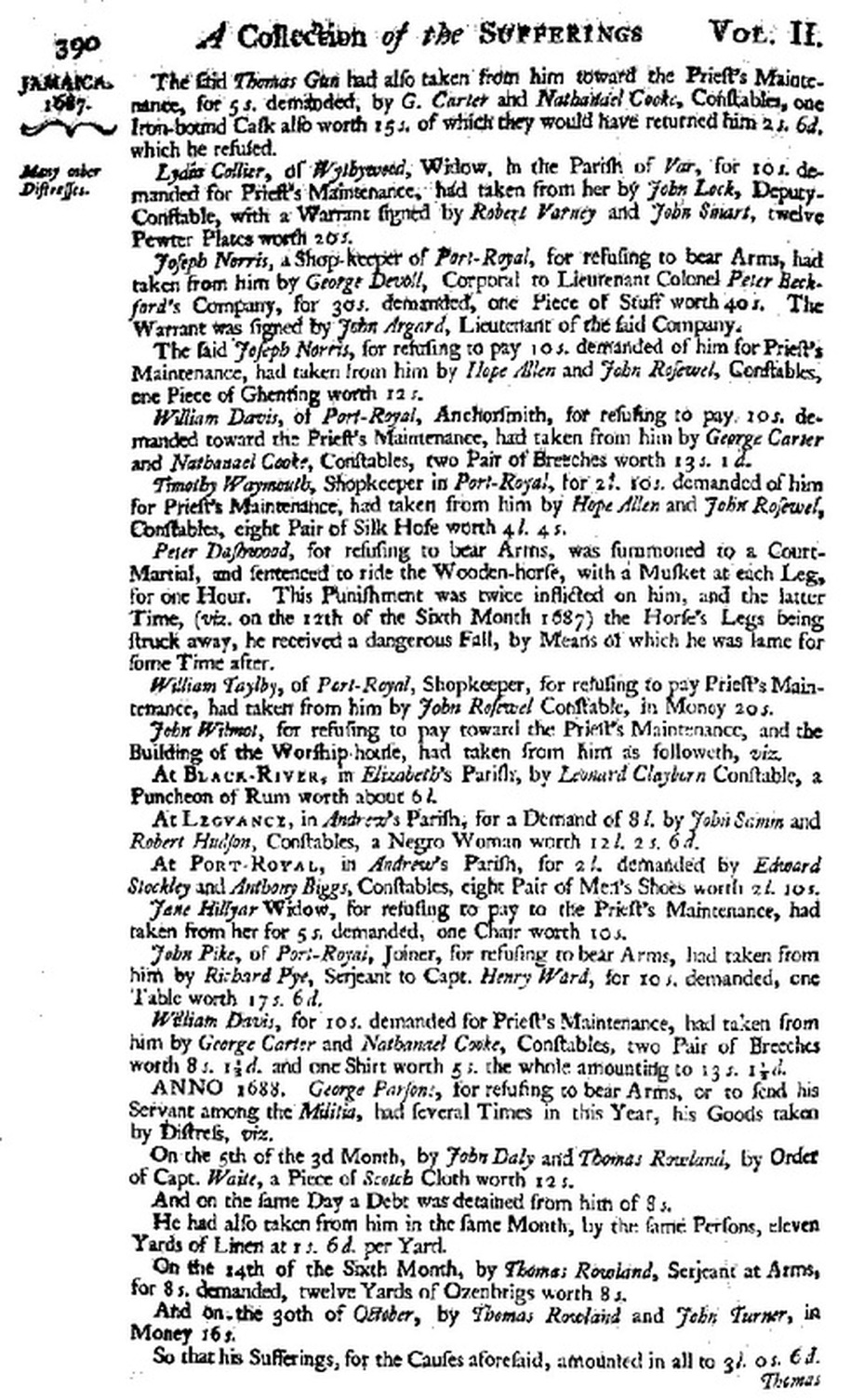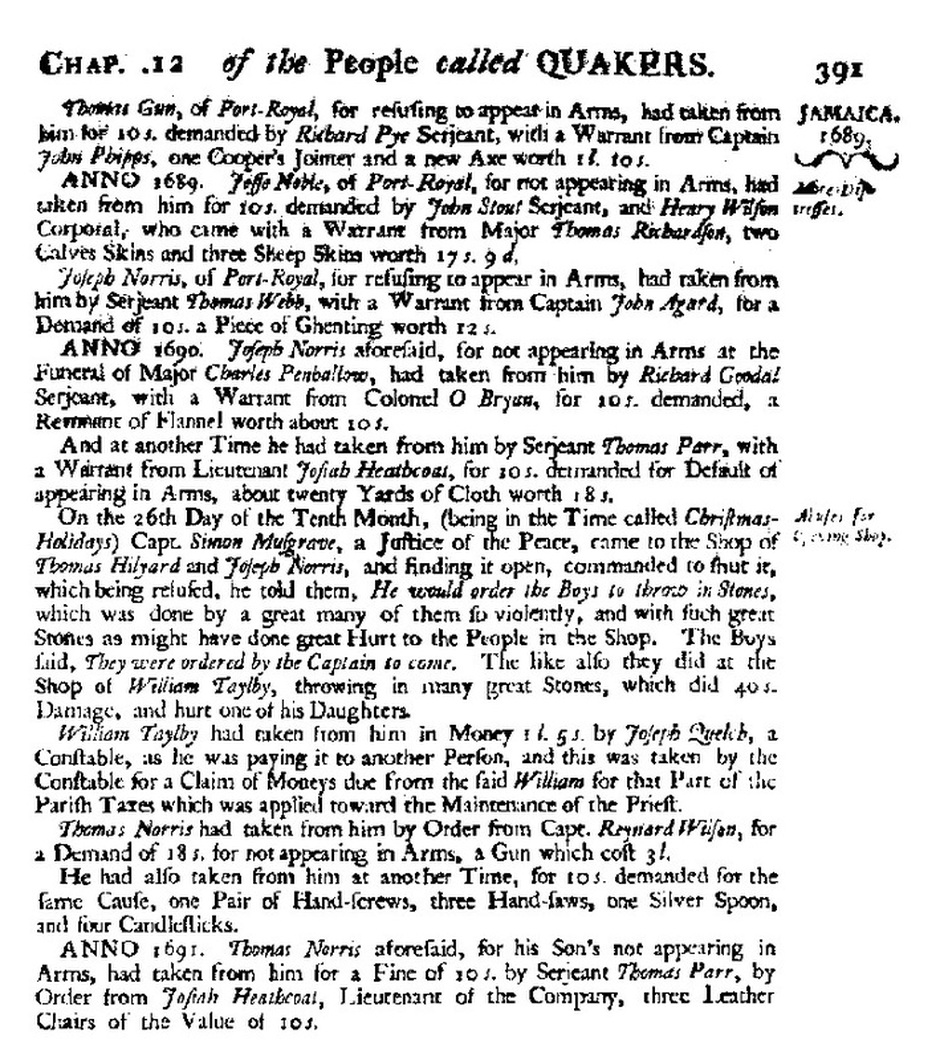George Fox and other early Friends in Jamaica
from The Autobiography of George Fox
[1908 edition]
Chapter XVIII Two Years in America, 1671-3
[1908 edition]
Chapter XVIII Two Years in America, 1671-3
I set sail from Barbadoes to Jamaica on the 8th of the Eleventh month, 1671; Robert Widders, William Edmundson, Solomon Eccles and Elizabeth Hooton going with me. We had a quick and easy passage to Jamaica, where we met again with our Friends James Lancaster, John Cartwright, and George Pattison, who had been labouring there in the service of Truth; into which we forthwith entered with them, travelling up and down through the island, which is large; and a brave country it is, though the people are, many of them, debauched and wicked.
We had much service. There was a great convincement, and many received the Truth, some of whom were people of account in the world. We had many meetings there, which were large, and very quiet. The people were civil to us, so that not a mouth was opened against us. I was twice with the Governor, and some other magistrates, who all carried themselves kindly towards me.
About a week after we landed in Jamaica, Elizabeth Hooton, a woman of great age, who had travelled much in Truth’s service, and suffered much for it, departed this life. She was well the day before she died, and departed in peace, like a lamb, bearing testimony to Truth at her departure.
When we had been about seven weeks in Jamaica, had brought Friends into pretty good order, and settled several meetings amongst them, we left Solomon Eccles there; the rest of us embarked for Maryland, leaving Friends and Truth prosperous in Jamaica, the Lord’s power being over all, and His blessed Seed reigning.
Before I left Jamaica I wrote another letter to my wife, as follows:
“My Dear Heart,
“To whom is my love, and to the children, in that which changeth not, but is over all; and to all Friends in those parts. I have been in Jamaica about five weeks. Friends here are generally well, and there is a convincement: but things would be too large to write of. Sufferings in every place attend me; but the blessed Seed is over all; the great Lord be praised, who is Lord of sea and land, and of all things therein. We intend to pass from hence about the beginning of next month, towards Maryland, if the Lord please. Dwell all of you in the Seed of God; in His Truth I rest in love to you all.
G. F.
“Jamaica, 23d of 12th Month, 1671.”
We went on board on the 8th of First month, 1671-2, and, having contrary winds, were a full week sailing forwards and backwards before we could get out of sight of Jamaica.
A difficult voyage this proved, and dangerous, especially in passing through the Gulf of Florida, where we met with many trials by winds and storms.
We had much service. There was a great convincement, and many received the Truth, some of whom were people of account in the world. We had many meetings there, which were large, and very quiet. The people were civil to us, so that not a mouth was opened against us. I was twice with the Governor, and some other magistrates, who all carried themselves kindly towards me.
About a week after we landed in Jamaica, Elizabeth Hooton, a woman of great age, who had travelled much in Truth’s service, and suffered much for it, departed this life. She was well the day before she died, and departed in peace, like a lamb, bearing testimony to Truth at her departure.
When we had been about seven weeks in Jamaica, had brought Friends into pretty good order, and settled several meetings amongst them, we left Solomon Eccles there; the rest of us embarked for Maryland, leaving Friends and Truth prosperous in Jamaica, the Lord’s power being over all, and His blessed Seed reigning.
Before I left Jamaica I wrote another letter to my wife, as follows:
“My Dear Heart,
“To whom is my love, and to the children, in that which changeth not, but is over all; and to all Friends in those parts. I have been in Jamaica about five weeks. Friends here are generally well, and there is a convincement: but things would be too large to write of. Sufferings in every place attend me; but the blessed Seed is over all; the great Lord be praised, who is Lord of sea and land, and of all things therein. We intend to pass from hence about the beginning of next month, towards Maryland, if the Lord please. Dwell all of you in the Seed of God; in His Truth I rest in love to you all.
G. F.
“Jamaica, 23d of 12th Month, 1671.”
We went on board on the 8th of First month, 1671-2, and, having contrary winds, were a full week sailing forwards and backwards before we could get out of sight of Jamaica.
A difficult voyage this proved, and dangerous, especially in passing through the Gulf of Florida, where we met with many trials by winds and storms.
Wiiliam Edmundson, one of Fox's companions also wrote of their stay in Jamaica: When we were clear in our service, we took shipping for Jamaica, namely, George Fox, Robert Widders, Solomon Eccles, Elizabeth Hooton and I, being about ten days at sea, we landed at Port-Royal in Jamaica.
We traveled much in that island, and had good service in gathering people to the Lord Jesus Christ, and settling meetings among them. James Lancaster and I travelled over that called Mount-Diabolo, to the north side of the island, where the people received us gladly, and came to meetings, several were convinced and received the truth; we settled a meeting there for the worship of God.
After some time of labor in the Gospel of Christ, having finished our service in that island, we committed them to the Lord's keeping, and took shipping for Maryland; but Elizabeth Hooton died in Jamaica, being an ancient woman. We left Solomon Eccles there in truth's service, the rest of us shipped with George Fox, for Maryland.
from: A JOURNAL OF THE LIFE OF WILLIAM EDMUNDSON: The Irish Hammer
Is not my word like as a fire? saith the LORD; and like a hammer that breaketh the rock in pieces? Jeremiah 23:29
We traveled much in that island, and had good service in gathering people to the Lord Jesus Christ, and settling meetings among them. James Lancaster and I travelled over that called Mount-Diabolo, to the north side of the island, where the people received us gladly, and came to meetings, several were convinced and received the truth; we settled a meeting there for the worship of God.
After some time of labor in the Gospel of Christ, having finished our service in that island, we committed them to the Lord's keeping, and took shipping for Maryland; but Elizabeth Hooton died in Jamaica, being an ancient woman. We left Solomon Eccles there in truth's service, the rest of us shipped with George Fox, for Maryland.
from: A JOURNAL OF THE LIFE OF WILLIAM EDMUNDSON: The Irish Hammer
Is not my word like as a fire? saith the LORD; and like a hammer that breaketh the rock in pieces? Jeremiah 23:29
. . . and afterwards 'By these Friends we understood that William Edmundson, having been at Rhode Island and New England, was gone thence for Ireland; that Solomon Eccles, coming from Jamaica and landing at Boston in New England, was taken at a meeting there, and banished to Barbadoes; that John Stubbs and another Friend were gone into New Jersey, and several other Friends to Barbadoes, Jamaica, and the Leeward Islands. It was matter of joy to us to understand that the work of the Lord went on and prospered, and that Friends were unwearied and diligent in the service. ' [from Fox's Autobiography.]
Quakers from England were among the earliest settlers in Jamaica in the years immediately after the English conquest of the island in 1655, but by the mid-18th century there were no Quaker meetings in the island and only a few scattered individuals professing Quaker principles.
Colonel Edward D'Oyley, who was in charge in Jamaica for most of the period from the conquest under Oliver Cromwell in 1655 to the restoration of Charles II in 1660, ('commander in chief both by sea and land') had the unenviable task of organising the new colony and trying to establish a settler population. Among the early settlers were people known as Quakers, and D'Oyley knew nothing about them, so wrote to Cromwell's Secretary of State, John Thurloe, expressing his concerns and his desire to do what his superiors wanted:
Colonel Edward D'Oyley, who was in charge in Jamaica for most of the period from the conquest under Oliver Cromwell in 1655 to the restoration of Charles II in 1660, ('commander in chief both by sea and land') had the unenviable task of organising the new colony and trying to establish a settler population. Among the early settlers were people known as Quakers, and D'Oyley knew nothing about them, so wrote to Cromwell's Secretary of State, John Thurloe, expressing his concerns and his desire to do what his superiors wanted:
Feb 28 1657:
There are some people lately come hither called Quakers, who have brought letters of credit, and do disperse books amongst us. Now by education and judgment prompting me to an owning of all, that pretend any way to Godliness and righteousness (whereof these people have a very great appearance) and the prints telling me, that the heads of their people are contriving against the Government and accounted conspirators against his Highness (so the book calls them), and humbly to seek your honour’s directions that my carriage in being tender to them, who are people of an unblameable life, and to whose acting I am a stranger, may not procure blame from him in whose service I am; being desirous to steer my course to the interest I serve, and to appear very heartily and clearly his Highness’s faithful subject.
Clearly D'Oyley accepted that the Quakers were godly folk, but was not sure whether or not they were also dangerous subversives
Some Friends from Barbados fled to Jamaica in 1658 having refused to pay rates and serve in the militia there.
1662: two Quaker ministers, Ann Robinson and Oswell Heritage, preached the Quaker message in the island.
In 1662, Lord Windsor, the Governor, and the Council promised the right to gather in meetings for 'Freedom in matters of Conscience' to all who paid their taxes and contributed financially to the defence of the island even if they would not bear arms themselves.
In 1664, however, a very eccentric Quaker, John Perrott, caused an uproar over his theological ideas: I am getting a book on this strange man [that book never materialised - I must try again!], so may be I can give more information on this episode - Perrot appears to have died in Jamaica. One of his earlier projects had been to go to Rome in an attempt to convert the Pope to his theological views.
The Quakers continued to have problems because of their refusal to serve in the militia and as sworn jurors
1662: two Quaker ministers, Ann Robinson and Oswell Heritage, preached the Quaker message in the island.
In 1662, Lord Windsor, the Governor, and the Council promised the right to gather in meetings for 'Freedom in matters of Conscience' to all who paid their taxes and contributed financially to the defence of the island even if they would not bear arms themselves.
In 1664, however, a very eccentric Quaker, John Perrott, caused an uproar over his theological ideas: I am getting a book on this strange man [that book never materialised - I must try again!], so may be I can give more information on this episode - Perrot appears to have died in Jamaica. One of his earlier projects had been to go to Rome in an attempt to convert the Pope to his theological views.
The Quakers continued to have problems because of their refusal to serve in the militia and as sworn jurors
Quakers continued to settle in Jamaica, though the items below show that at least some of them were transported to the island to serve seven year sentences presumably for refusal to comply with religious and military regulations in England:
8 March 1665
Whereas his Majestie hath appointed severall Masters of Ships to carry some of the Quakers now remayning in Newgate [a prison in London], adjudged to be transported to his Majesties Plantations according to the Liste hereunto annexed, It was this day Ordered by his Majestie in Councill, That the Lord Cheif Justice of the Kings Bench do forthwith give directions to the Sheriffs of London to cause the respective Numbers of the said Quakers adjudged to be transported, to be forthwith delivered on board the said severall ships taking a Recognizance under the hands of the repective Masters for the safe custody of the said Quakers, and delivery of them to the Governors of the severall Plantations whether they are bound.
8 March 1665
Whereas his Majestie hath appointed severall Masters of Ships to carry some of the Quakers now remayning in Newgate [a prison in London], adjudged to be transported to his Majesties Plantations according to the Liste hereunto annexed, It was this day Ordered by his Majestie in Councill, That the Lord Cheif Justice of the Kings Bench do forthwith give directions to the Sheriffs of London to cause the respective Numbers of the said Quakers adjudged to be transported, to be forthwith delivered on board the said severall ships taking a Recognizance under the hands of the repective Masters for the safe custody of the said Quakers, and delivery of them to the Governors of the severall Plantations whether they are bound.
|
A Liste of the names of the Masters of Ships bound to the Plantations, to transport Convicted Quakers:
Jamaica Merchant, William Gainsford Master, bound for Jamaica, is to carry Three Quakers John and Thomas, John Ceely Master, bound for the Barbados, is to transport Six Quakers Amity of London, Francis Appleby Master, bound for Mevis [sic], is to transport Seven Quakers |
[The Officers and Farmers of the Customs are directed to allow these vessels to proceed as soon as they are satisfied that each has embarked its due contingent of Quakers.
Instructions are given to the Governors of Nevis, Jamaica and Barbados to receive the transported Quakers, and to employ such as servants in the plantation of them as did not defray the cost of their own transportation. All are to be detained for a space of seven years.]
[On the 15th sixty Quakers now in Newgate adjudged to be transported are ordered to be handed over by the Sheriff of London to William Fudge, master of the Black Eagle of London, a ship of about one hundred tons burden, manned by a master, eight mariners and a boy, to be conveyed to Jamaica, on the same conditions as in the previous order. The usual orders are issued for freeing the vessel from restrictions and for the redemption of the Quakers by the governor of Jamaica.]
Instructions are given to the Governors of Nevis, Jamaica and Barbados to receive the transported Quakers, and to employ such as servants in the plantation of them as did not defray the cost of their own transportation. All are to be detained for a space of seven years.]
[On the 15th sixty Quakers now in Newgate adjudged to be transported are ordered to be handed over by the Sheriff of London to William Fudge, master of the Black Eagle of London, a ship of about one hundred tons burden, manned by a master, eight mariners and a boy, to be conveyed to Jamaica, on the same conditions as in the previous order. The usual orders are issued for freeing the vessel from restrictions and for the redemption of the Quakers by the governor of Jamaica.]
from: Acts of the Privy Council of England: Colonial Series, Vol. 1, AD 1613-1680
First Published London: HMSO, 1908.
First Published London: HMSO, 1908.
In 1675 Lord Vaughan proclaimed the Act of Indulgence in Jamaica, which provided some relief to Dissenters in relation to freedom of worship.
This letter from Francis Crow, a Church of England clergyman who had been ejected from his parish in England because he did not accept the teachings of the church after Charles II's restoration, shows the strength of the Quakers in Port Royal before the earthquake -
This letter from Francis Crow, a Church of England clergyman who had been ejected from his parish in England because he did not accept the teachings of the church after Charles II's restoration, shows the strength of the Quakers in Port Royal before the earthquake -
Letter dated 7th March 1687 from Rev. Francis Crow at Port Royal Jamaica
to Rev. Giles Firmin at Ridgewell, Essex, England.
… whereas there is nothing known here but a form of preaching on the Lord’s Day, and many that go on in the common road of public formality may be said to be as dead and senseless here as almost anywhere else; and the people dissatisfied with this have turned Anabaptists and Quakers.
….
Our liberties are like to be as long lived as in any of the King’s plantations; for indeed they can hardly be taken away without apparent danger if not ruin to the island, considering the multitude of Jews upon the Point [Pt Royal] and the many Quakers there are, both here and in the country plantations.
SUFFERINGS OF THE QUAKERS
As the lists above and below show, Quakers, or members of the Society of Friends, like members of all religious groups except the Church of England, suffered restrictions on their civil rights and varying levels of harassment. This was so in England in the 17th and 18th centuries, and likewise in the English colonies.
The punishments listed were chiefly seizures of property, often extortionate, to cover fines. It is interesting to note that in 1687 a Quaker was subjected to the military punishment of 'riding the wooden horse'.
|
Peter Dashwood, for refusing to bear Arms, was summoned to a Court-Martial, and sentenced to ride the Wooden-horse, with a Musket at each Leg, for one Hour. This Punishment was twice inflicted on him, and the latter Time, ( viz. on the 12th of the Sixth Month 1687) the Horse's Legs being struck away, he received a dangerous Fall, by Means of which he was same for some Time after.
|
an account of the treatment that Quakers experienced in 17th century Jamaica -
